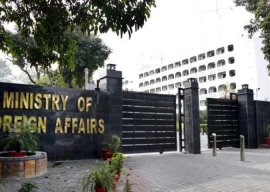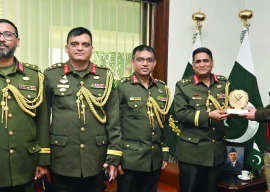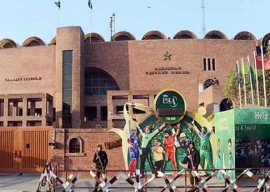
The Islamic State group claimed responsibility for the latest attack in the Afghan capital, a day before the government's separate ceasefire with the Taliban is due to start.
The blast happened at the main gate of the Ministry of Rural Rehabilitation and Development, police and health ministry spokesperson said.
Employees were gathered at the entrance of the compound waiting for a bus to take them home when the bomber blew himself up in the crowd, said rural ministry spokesperson Faridoon Azhand, who was inside the building at the time.
19 Afghan police killed in Taliban attack on base
"I was in my office when I heard a big blast," another employee said, adding, "Most of my colleagues were leaving for the day to go home. I am worried about my colleagues. We are told to stay inside for now."
Police spokesperson Hashmat Stanikzai confirmed the attacker had targeted the employees as they waited for the bus at around 1:00pm (0830 GMT). They were leaving early due to the holy month of Ramazan, when most Muslims fast from sunrise to sunset.
The attack, which IS claimed via their Amaq propaganda agency, killed 13 people and wounded 31, Azhand said. A doctor at a hospital treating many of the victims confirmed the death toll.
Police and health officials said earlier that 12 people were killed and 31 wounded. The attack was just one of several around Afghanistan Monday.
Militants raided a government building in the eastern city of Jalalabad in Nangarhar province, prompting terrified employees to jump out of the windows, officials said.
A suicide bomber blew himself up at the entrance to the education department, triggering a fierce battle between gunmen and Afghan security forces, Nangarhar provincial governor spokesman Attaullah Khogyani said.
At least 10 people were wounded, city health department director Najibullah Kamawal said.
In another incident an explosion inside a house in Kabul killed one person and wounded three others, Stanikzai said.
The three wounded were detained after police found explosives, including suicide vests, in the building which they suspect was being used by militants planning attacks in the city.
Taliban and IS militants have stepped up their attacks on Kabul in particular in recent years, making it the deadliest place in the country for civilians.
Afghan President Ashraf Ghani on Thursday announced police and troops would halt hostilities with the Taliban for a week though he warned that operations against other groups, including IS, would continue.
The ceasefire would last from the "27th of Ramazan until the fifth day of Eidul Fitr", he said, indicating it could run from June 12-19.
The Taliban said on Saturday their fighters would stop attacking Afghan security forces but only for the first three days of Eid. They said they would continue attacking US-led Nato troops.
Afghan Taliban raise hopes with first-of-its-kind Eid ceasefire
It is the first time the militants have agreed to suspend fighting since the 2001 US invasion, and the move was largely welcomed by war-weary Afghans.
Both sides have vowed to retaliate if attacked during the ceasefire.
If it holds, analysts had expressed cautious optimism that the agreements could help build trust between the government and the Taliban and lay the groundwork for peace talks.
But with myriad armed groups in Afghanistan, there are still fears that IS could continue to carry out attacks or even be helped by the Haqqani Network, a brutal arm of the Taliban that is suspected of partnering with IS on attacks in Kabul in the past.
The latest violence comes as dozens of protesters march hundreds of kilometres towards Kabul to demand an end to the nearly 17-year conflict.
1737019147-0/fizza-(38)1737019147-0-405x300.webp)


1737017947-0/biden-(4)1737017947-0-165x106.webp)


1737018675-0/sidra--(97)1737018675-0-270x192.webp)
1737019689-0/Tribune-N-(5)1737019689-0-270x192.webp)


1737012863-0/sidra--(96)1737012863-0-270x192.webp)












COMMENTS
Comments are moderated and generally will be posted if they are on-topic and not abusive.
For more information, please see our Comments FAQ